|
|
|
Sort Order |
|
|
|
Items / Page
|
|
|
|
|
|
|
| Srl | Item |
| 1 |
ID:
140810
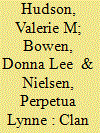

|
|
|
|
|
| Summary/Abstract |
We propose that the relative influence of clans is an important explanatory factor producing significant variation in state stability and security across societies. We explore the micro-level processes that link clan predominance with dysfunctional syndromes of state behavior. Clans typically privilege agnatic descent from the patriline and are characterized by extreme subordination of women effected through marriage practices. Particular types of marriage practices give rise to particular types of political orders and may be fiercely guarded for just this reason. We construct and validate a Clan Governance Index to investigate which variables related to women's subordination to the patriline in marriage are useful to include in such an index. We then show that clan governance is a useful predictor of indicators of state stability and security, and we probe the value added by its inclusion with other conventional explanatory variables often linked to state stability and security.
|
|
|
|
|
|
|
|
|
|
|
|
|
|
|
|
| 2 |
ID:
140813


|
|
|
|
|
| Summary/Abstract |
According to the classical perspective, polity size and democracy are inversely related. In this article, we argue that there is an important exception that manifests itself at the district level in settings where multiparty competition is allowed. Specifically, we find that larger districts encourage greater contestation. This results from a little-noticed mechanical effect as well as from several features of constituencies that are affected by size and have direct repercussions for contestation. To demonstrate this thesis we assembled a unique dataset, the Multi-level Election Archive (MLEA), which unites electoral contests across a variety of districts (national, regional, and local) and elective offices from the eighteenth century to the present, including a total of 88 countries, 2,344 elections, 79,658 districts, and more than 400,000 contests. With this evidence we were able to conduct a broad array of statistical tests, some global and others focused on particular countries or election types, all of which support our general argument.
|
|
|
|
|
|
|
|
|
|
|
|
|
|
|
|
| 3 |
ID:
140818
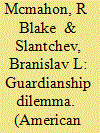

|
|
|
| 4 |
ID:
140805
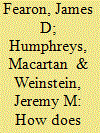

|
|
|
|
|
| Summary/Abstract |
Social cooperation is critical to a wide variety of political and economic outcomes. For this reason, international donors have embraced interventions designed to strengthen the ability of communities to solve collective-action problems, especially in post-conflict settings. We exploit the random assignment of a development program in Liberia to assess the effects of such interventions. Using a matching funds experiment we find evidence that these interventions can alter cooperation capacity. However, we observe effects only in communities in which, by design, both men and women faced the collective action challenge. Focusing on mechanisms, we find evidence that program effects worked through improvements in mobilization capacity that may have enhanced communities’ ability to coordinate to solve mixed gender problems. These gains did not operate in areas where only women took part in the matching funds experiment, possibly because they could rely on traditional institutions unaffected by the external intervention. The combined evidence suggests that the impact of donor interventions designed to enhance cooperation can depend critically on the kinds of social dilemmas that communities face, and the flexibility they have in determining who should solve them.
|
|
|
|
|
|
|
|
|
|
|
|
|
|
|
|
| 5 |
ID:
140802
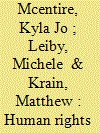

|
|
|
|
|
| Summary/Abstract |
Human Right Organizations (HROs) attempt to shape individuals’ values and mobilize them to act. Yet little systematic research has been done to evaluate the efficacy of these efforts. We identified the three most common messaging techniques: (1) informational frames; (2) personal frames; and (3) motivational frames. We tested their efficacy using an experimental research design in which participants were randomly assigned to the control group (shown no campaign materials) or one of the treatment groups shown a campaign against sleep deprivation featuring one of these framing strategies. We then surveyed participants regarding their attitudes and their willingness to act. Results demonstrate that all three framing strategies are more effective at mobilizing consensus than action. Personal narratives are the most consistently successful, increasing individuals’ sense of knowledge on the issue and their emotional reaction to the issue, leading them to reject the practice and participate in a campaign to demand its cessation.
|
|
|
|
|
|
|
|
|
|
|
|
|
|
|
|
| 6 |
ID:
140808
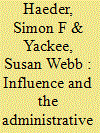

|
|
|
|
|
| Summary/Abstract |
All administrative processes contain points of entry for politics, and the U.S. president's use of the Office of Management and Budget (OMB) to review government regulations is no exception. Specifically, OMB review can open up a pathway for interest groups to lobby for policy change. We theorize that interest group lobbying can be influential during OMB review, especially when there is consensus across groups. We use a selection model to test our argument with more than 1,500 regulations written by federal agencies that were subjected to OMB review. We find that lobbying is associated with change during OMB review. We also demonstrate that, when only business groups lobby, we are more likely to see rule change; however, the same is not true for public interest groups. We supplement these results with illustrative examples suggesting that interest groups can, at times, use OMB review to influence the content of legally binding government regulations.
|
|
|
|
|
|
|
|
|
|
|
|
|
|
|
|
| 7 |
ID:
140804
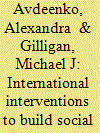

|
|
|
|
|
| Summary/Abstract |
Increasingly the international community attempts to improve local public infrastructure in developing countries by creating more participatory local governance and social capital. We report on a randomized field experiment conducted in 24 communities (16 treated and 8 control) in rural Sudan. We offer a clearer theoretical statement of how these programs might alter the political landscape of the recipient villages. We measure norms using lab-in-the-field techniques and we measure network density with a survey of our 475 lab subjects. We appraise the participatory character of local governance and civic participation with a survey of 576 households. The program did not affect either networks or norms, but civic participation and the participatory nature of local governance increased. Thus we attribute the increase in citizen participation not to social capital growth but to more open local governing institutions.
|
|
|
|
|
|
|
|
|
|
|
|
|
|
|
|
| 8 |
ID:
140816
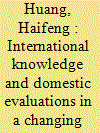

|
|
|
|
|
| Summary/Abstract |
Do knowledge and information about foreign countries affect people’s evaluation of domestic situations? Using unique survey and experimental data, this research finds that Chinese citizens with more positive perceptions and especially overestimation of foreign socioeconomic conditions have more negative evaluations of China and the Chinese government. Moreover, correcting socioeconomic misinformation about foreign countries improves one’s evaluations of China, indicating that the causal direction is at least partly from rosier estimation of foreign conditions to lower domestic evaluations. The relationship between domestic evaluations and international political knowledge, as measured by familiarity with political affairs and figures in foreign countries, is typically not significant, although awareness of political instability in other countries can increase satisfaction with one’s own country. These results contribute both substantively and conceptually to the study of politically relevant knowledge and information, and shed new light on the nuances of information flow and opinion formation in changing societies.
|
|
|
|
|
|
|
|
|
|
|
|
|
|
|
|
| 9 |
ID:
140806
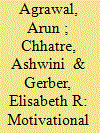

|
|
|
|
|
| Summary/Abstract |
We used a quasi-experimental research design to study the extent of motivational crowding in a recent sustainable development intervention in northern India. The project provided participants with both private and communal material benefits to enhance their incomes, and environmental and social information to inculcate pro-environmental motivations. We compared changes in reported motivations of participants for conserving forest resources, before and after project implementation, with changes in reported motivations of matched nonparticipants. We found that villagers who received private economic benefits were more likely to change from an environmental to an economic motivation for forest protection, whereas those who engaged in communal activities related to the project were less likely to change from an environmental to an economic motivation. These results, which indicate a substantial but conditional degree of motivational crowding, clarify the relationships between institutional change, incentives, and motivations and have important implications for the design of sustainable development interventions.
|
|
|
|
|
|
|
|
|
|
|
|
|
|
|
|
| 10 |
ID:
140820


|
|
|
| 11 |
ID:
140817
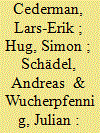

|
|
|
| 12 |
ID:
140809
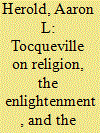

|
|
|
|
|
| Summary/Abstract |
This article proposes a new interpretation of Tocqueville's thought, one that focuses on his account of religious psychology. From his observations of America, Tocqueville concludes that human beings have a natural hope for immortality—a hope that is driven by a paradoxical but ineradicable desire to affirm and forget oneself simultaneously. Tocqueville formulates this insight as a critique of the Enlightenment thinkers who laid the foundations for liberal democracy; I argue that he crafts his “new political science” to provide healthy outlets for the religious hopes whose existence these thinkers largely denied and whose anomalous presence in the United States has accordingly led to unforeseen dangers. Tocqueville's analysis not only helps us understand and begin to remedy those dissatisfactions that characterize democracy today but it also reveals his theoretical depth, political moderation, and sober assessment of our moral psychology in a way not seen before.
|
|
|
|
|
|
|
|
|
|
|
|
|
|
|
|
| 13 |
ID:
140812
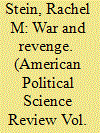

|
|
|
|
|
| Summary/Abstract |
While we know much about what differentiates the conflict behavior of democracies from autocracies, we know relatively little about why some democracies are more belligerent than others. In contrast to existing studies, I argue that it is public opinion and not institutions that drives these differences. All democratic leaders have an incentive to take public opinion into account, but public opinion is not the same everywhere. Individuals’ attitudes towards war are shaped by core beliefs about revenge, which vary across countries. Leaders with more vengeful populations will be more likely to initiate conflicts because they generate popular support for war more effectively. Using retention of capital punishment as a proxy for broad endorsement of revenge, I find that democracies that have retained the death penalty for longer periods of time are significantly more likely to initiate conflicts. This research has important implications for existing theories of democracy and war.
|
|
|
|
|
|
|
|
|
|
|
|
|
|
|
|
| 14 |
ID:
140815
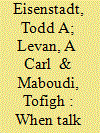

|
|
|
|
|
| Summary/Abstract |
Under what circumstances do new constitutions promote democracy? Between 1974 and 2011, the level of democracy increased in 62 countries following the adoption of a new constitution, but decreased or stayed the same in 70 others. Using data covering all 138 new constitutions in 118 countries during that period, we explain this divergence through empirical tests showing that overall increased participation during the process of making the constitution positively impacts postpromulgation levels of democracy. Then, after disaggregating constitution-making into three stages (drafting, debating, and ratification) we find compelling evidence through robust statistical tests that the degree of citizen participation in the drafting stage has a much greater impact on the resulting regime. This lends support to some core principles of “deliberative” theories of democracy. We conclude that constitutional reformers should focus more on generating public “buy in” at the front end of the constitution-making process, rather than concentrating on ratification and referendums at the “back end” that are unlikely to correct for an “original sin” of limited citizen deliberation during drafting.
|
|
|
|
|
|
|
|
|
|
|
|
|
|
|
|
| 15 |
ID:
140807
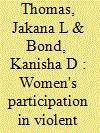

|
|
|
|
|
| Summary/Abstract |
While women have participated in a variety of militarized movements across time and space, the determinants of their participation have not been examined systematically. In this article, we seek to explain variation in women's involvement across different violent political organizations. Our research highlights the role that organizational attributes play in influencing women's presence in violent groups. We evaluate our hypotheses using an original dataset on women's participation in and characteristics of 166 violent political organizations across 19 African countries from 1950 to 2011. Our empirical results show strong support for our argument that organization-based opportunities for women's participation explain whether female members are present in a group.
|
|
|
|
|
|
|
|
|
|
|
|
|
|
|
|
|
|
|
|
|